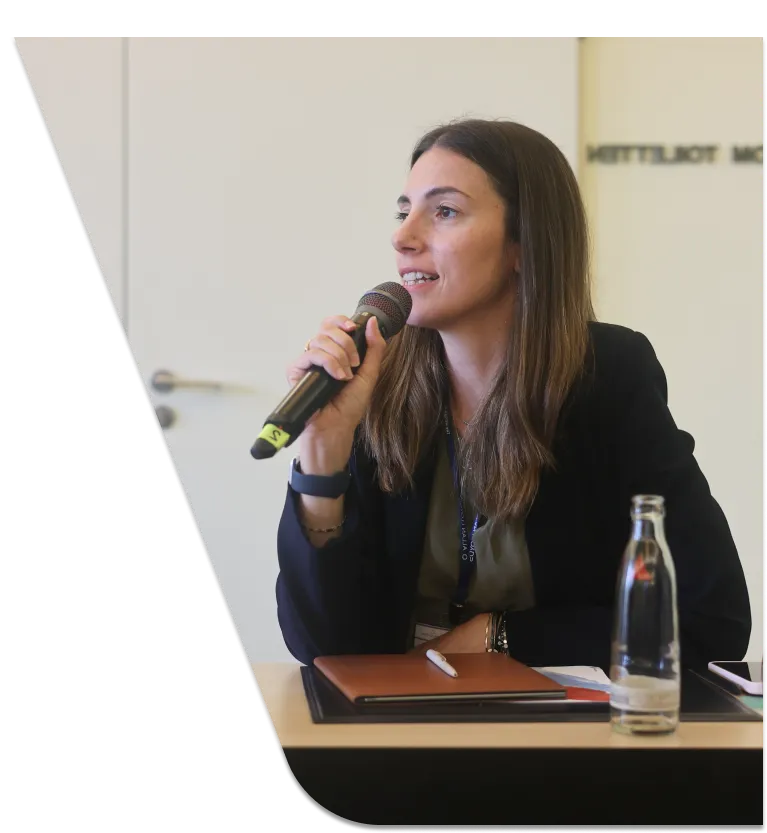
12th Annual Risk Management and Pharmacovigilance Summit
Event is Over
Stay Updated for 2026 edition
Past Speakers
SEE THE PREVIOUS SPEAKERS & CASE STUDIES
CASE STUDY
Assessment of Benefit-Risk During Clinical Development
Third parties are continuously becoming more relevant source of operational risk, which is getting more and more complex to manage. DORA brought additional complexities to the topic, but in truth the management of third parties was always one of the key areas of operational risk issues.
- 01The Regulator perspective on benefit-risk assessment during drug development
- 02Use of the structured benefit-risk assessment framework during drug development to inform milestone decisions
- 03Structured benefit-risk assessment during drug development — an evolving and iterative process to understand benefit-risk in a patient-centric manner
The presentation will give an overview of the main topics and challenges of supply chain and logistics in an environment with dangerous chemicals and quality-sensitive products. You will get insights regarding a make-or-buy decision for storage and distribution and several other best practices. With regard to the actual “world of transformation”, there will also be interesting thoughts about deployment & transformation — especially how to find the right factors in scaling the final positioning of a so-called minimum viable product.
CASE STUDY
Unravelling the Complexity of Signal Detection and Risk Assessments on the Oncology Therapeutic Area
This presentation aims to emphasise the challenges of signal detection and risk assessments within the Oncology Therapeutic Area. In addition, it provides some useful insights on how to address some of the main challenges in this landscape.
- 01Highlight the main differences & challenges of Oncology vs other Therapeutical Areas
- 02Main challenges in signal detection in Oncology
- 03Consideration of benefit-risk balance in the combination setting in Oncology
The estimation of risk-neutral default probabilities in the context of securitisation swaps, MBS/ABS bonds and collateralised debt obligations always represents a challenge, often leading to disagreement among market participants. In this talk, we present a simple methodology to rapidly estimate upper and lower bounds on default and prepayment risk, as implied by the risk-neutral valuation theory. Some examples are provided in the context of mortgage-backed securities (MBS) and collateralised debt obligations (CDOs). Assumptions made are exposed in detail to analyse the weak and strong points of this methodology.
CASE STUDY
The Pitfalls of the EU PSMF
How RBI Group has established prudential compliance newly with experience ofits Data Transformation journey towards business value and strategy leveraging federated data governance with digitalization, Reglechs and Al capabilities.
Plasma-derived therapies (PDTs) are life-changing and life-sustaining medicines that people with rare and complex chronic diseases around the world rely on every day. Plasma is a scarce resource that cannot be made artificially, and hundreds of plasma donations – and sometimes over a thousand – are needed to make enough therapy for just one patient for one year. This is a complex, large-scale business in which growth in demand for therapies is outpacing supply – and patients’ lives are at stake. At Takeda, our priority is to ensure a sustained supply of PDTs for the patients worldwide who depend on them. This presentation will share more on how we harness data, digital, and technology (DD&T) to make every step of our end-to-end process better, faster, and more efficient – from using AI to advance operational efficiencies to developing novel device and digital solutions for patients.
- 01How insufficient attention to detail leads to errors, omissions, or inaccuracies in the PSMF?
- 02Cross-functional collaboration, a key aspect often forgotten
- 03Failure to update the PSMF, now what?
CASE STUDY
Future of Pharmacovigilance Systems — Lessons Learned From COVID-19 Pandemic
COVID-19 pandemic started in late 2019 in China, expanding worldwide rapidly in early 2020. It resulted in 7 mln deaths. It became a novel challenge to the pharmacovigilance system worldwide for the whole pharma industry, particularly those parties that introduced vaccines against COVID-19. The development of vaccines and the unprecedented volume of ISRs reported in a short period of time after mass vaccination programmes started resulted in various types of challenges that required new ways of managing data, risk, reporting, controls and application of new technologies. The pandemic provided lessons learned that impacted the future of effective pharmacovigilance systems.
- 01Pharmacovigilance conditions evolution during the COVID-19 pandemic
- 02EU countries’ role in generating vaccine ICSRs volumes
- 03Increasing role of patients/customers engagement in PV system and case volume
- 04Regulatory framework landscape changes and increase of national requirements
- 05Social media as the preferred communication channel for safety/efficacy topics and its implication for PV system
- 06Novel technologies application across all PV activities
This presentation aims to share a business perspective on the Basel IV implementation.






CASE STUDY
Assessment of Benefit-Risk During Clinical Development
Third parties are continuously becoming more relevant source of operational risk, which is getting more and more complex to manage. DORA brought additional complexities to the topic, but in truth the management of third parties was always one of the key areas of operational risk issues.
- 01The Regulator perspective on benefit-risk assessment during drug development
- 02Use of the structured benefit-risk assessment framework during drug development to inform milestone decisions
- 03Structured benefit-risk assessment during drug development — an evolving and iterative process to understand benefit-risk in a patient-centric manner
The presentation will give an overview of the main topics and challenges of supply chain and logistics in an environment with dangerous chemicals and quality-sensitive products. You will get insights regarding a make-or-buy decision for storage and distribution and several other best practices. With regard to the actual “world of transformation”, there will also be interesting thoughts about deployment & transformation — especially how to find the right factors in scaling the final positioning of a so-called minimum viable product.


CASE STUDY
Unravelling the Complexity of Signal Detection and Risk Assessments on the Oncology Therapeutic Area
This presentation aims to emphasise the challenges of signal detection and risk assessments within the Oncology Therapeutic Area. In addition, it provides some useful insights on how to address some of the main challenges in this landscape.
- 01Highlight the main differences & challenges of Oncology vs other Therapeutical Areas
- 02Main challenges in signal detection in Oncology
- 03Consideration of benefit-risk balance in the combination setting in Oncology
The estimation of risk-neutral default probabilities in the context of securitisation swaps, MBS/ABS bonds and collateralised debt obligations always represents a challenge, often leading to disagreement among market participants. In this talk, we present a simple methodology to rapidly estimate upper and lower bounds on default and prepayment risk, as implied by the risk-neutral valuation theory. Some examples are provided in the context of mortgage-backed securities (MBS) and collateralised debt obligations (CDOs). Assumptions made are exposed in detail to analyse the weak and strong points of this methodology.


CASE STUDY
The Pitfalls of the EU PSMF
How RBI Group has established prudential compliance newly with experience ofits Data Transformation journey towards business value and strategy leveraging federated data governance with digitalization, Reglechs and Al capabilities.
Plasma-derived therapies (PDTs) are life-changing and life-sustaining medicines that people with rare and complex chronic diseases around the world rely on every day. Plasma is a scarce resource that cannot be made artificially, and hundreds of plasma donations – and sometimes over a thousand – are needed to make enough therapy for just one patient for one year. This is a complex, large-scale business in which growth in demand for therapies is outpacing supply – and patients’ lives are at stake. At Takeda, our priority is to ensure a sustained supply of PDTs for the patients worldwide who depend on them. This presentation will share more on how we harness data, digital, and technology (DD&T) to make every step of our end-to-end process better, faster, and more efficient – from using AI to advance operational efficiencies to developing novel device and digital solutions for patients.
- 01How insufficient attention to detail leads to errors, omissions, or inaccuracies in the PSMF?
- 02Cross-functional collaboration, a key aspect often forgotten
- 03Failure to update the PSMF, now what?


CASE STUDY
Future of Pharmacovigilance Systems — Lessons Learned From COVID-19 Pandemic
COVID-19 pandemic started in late 2019 in China, expanding worldwide rapidly in early 2020. It resulted in 7 mln deaths. It became a novel challenge to the pharmacovigilance system worldwide for the whole pharma industry, particularly those parties that introduced vaccines against COVID-19. The development of vaccines and the unprecedented volume of ISRs reported in a short period of time after mass vaccination programmes started resulted in various types of challenges that required new ways of managing data, risk, reporting, controls and application of new technologies. The pandemic provided lessons learned that impacted the future of effective pharmacovigilance systems.
- 01Pharmacovigilance conditions evolution during the COVID-19 pandemic
- 02EU countries’ role in generating vaccine ICSRs volumes
- 03Increasing role of patients/customers engagement in PV system and case volume
- 04Regulatory framework landscape changes and increase of national requirements
- 05Social media as the preferred communication channel for safety/efficacy topics and its implication for PV system
- 06Novel technologies application across all PV activities
This presentation aims to share a business perspective on the Basel IV implementation.

Ahmed Nasr
Operations Director Egypt and Director Milk Africa & Turkey


Khaled Elsharkawy
Integrated Supply Chain Senior Director


Mueen Uddin Siddique
Senior Director – Access Network Procurement


Shannon Hore
Senior Vice President Procurement and Logistics


Sandeep Sharma
Director Group Procurement & International Markets Supply Chain

Hottest topics
LOOK AT THE TOPICS THAT WERE DISCUSSED

- 01Cost-efficient pharmacovigilance strategies: Doing more with less
- 02Managing large amounts of data efficiently in PV
- 03Developing a pharmacovigilance risk management plan with a RiskMAP for high-risk products
- 04How can real-world evidence revolutionise traditional pharmacovigilance methods?
- 05Regulatory inspections — Avoiding critical and major findings
- 06How can we amplify patient safety through innovative practices?
- 07Good pharmacovigilance practices (GVP) implementation
- 08Signal detection and evaluation in RMPV
Testimonials
What our users say about our conferences
Sponsor
Our Trusted Sponsor at This Summit




STAY UPDATED FOR THE 2026 EDITION
With All the Updates Regarding the Upcoming Edition of This Event.








